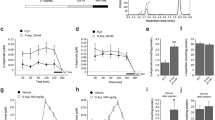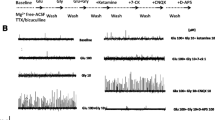Abstract
Kynurenic acid is an endogenous, competitive antagonist of the N-methyl-D-aspartate (NMDA) receptor glycine site. Accordingly, increasing the brain extracellular concentration of this metabolite may be a suitable alternative to administration of exogenous NMDA antagonists for the treatment of neurological disorders involving excessive NMDA-receptor activation. As competitive inhibition of organic anion transport by probenecid increased brain extracellular levels of kynurenic acid, the purpose of this study was to examine whether intracerebral application of probenecid reduced depolarizations evoked at the same tissue site by NMDA. Microdialysis probes incorporating an electrode were implanted into the striatum of rats and perfused with artificial cerebrospinal fluid. Local depolarizations were produced by perfusing 200 μM NMDA for 2 min, either alone, or co-applied with 1, 5 or 20 mM probenecid. The lowest concentration of probenecid had no effect. At 5 mM, probenecid abolished the hyperpolarization which consistently followed NMDA-responses, but the slight decrease in depolarization amplitude did not reach significance. Inhibition of post-depolarization hyperpolarization suggests that sustained, high extracellular concentrations of probenecid reduce the capacity of the tissue to recover from a depolarizing stimulus, presumably because intensive transport of probenecid imposes a heavy load on Na+, K+-ATPase. At 20 mM, probenecid inhibited NMDA-evoked depolarization by approximately 60% (from 4.7 ± 0.7 mV to 2.1 ± 0.2 mV; n = 6, P <>; 0.005). This effect was more marked 30 min after returning to perfusion with normal artificial cerebrospinal fluid, suggesting that high concentrations of probenecid may be toxic to nerve cells, or initiate long-lasting effects linked to inhibition of the transport of important organic anions. These data suggest that inhibition of organic anion transport is not, by itself, sufficient to protect against neurological disorders involving excessive NMDA-receptor activation. However, results from other studies suggest that it may be a valid strategy for enhancing the neuroprotective actions of treatments which stimulate kynurenic acid synthesis, or those of exogenous glutamate receptor antagonists.
Similar content being viewed by others
Author information
Authors and Affiliations
Additional information
Received: 2 February 1996 / Accepted: 27 August 1996
Rights and permissions
About this article
Cite this article
Urenjak, J., Obrenovitch, T. & Zilkha, E. Effect of probenecid on depolarizations evoked by N-methyl-D-aspartate (NMDA) in the rat striatum. Naunyn-Schmiedeberg's Arch Pharmacol 355, 36–42 (1996). https://doi.org/10.1007/PL00004915
Issue Date:
DOI: https://doi.org/10.1007/PL00004915




